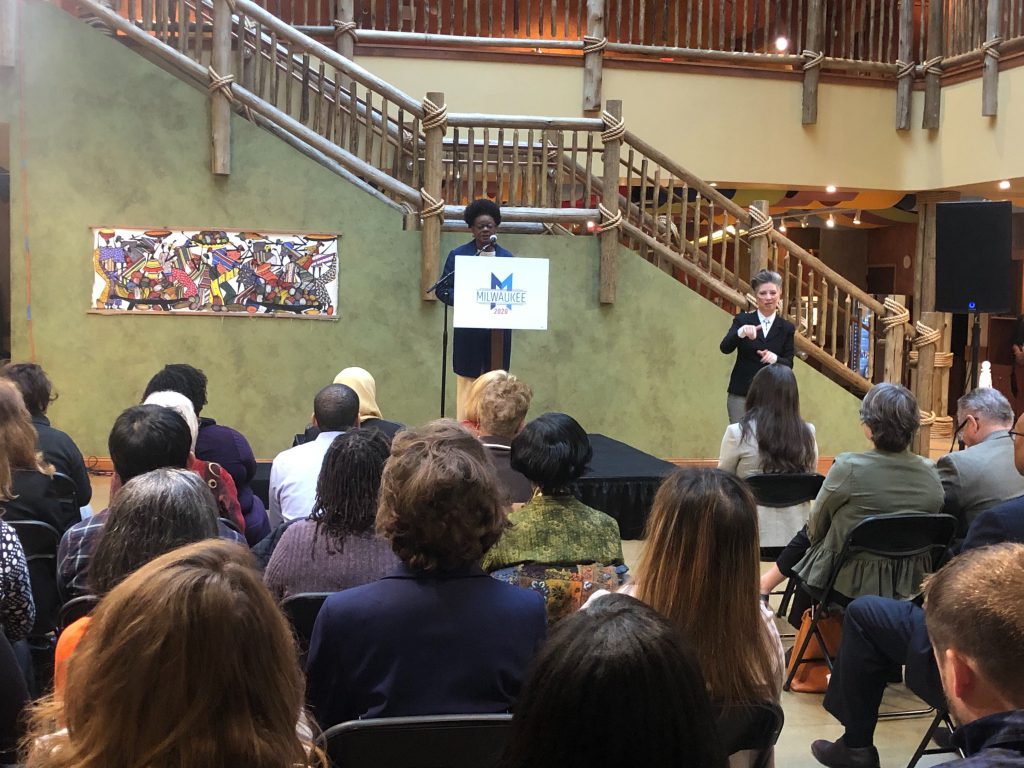Gwen Moore Discusses Her Abortion
One of few woman in Congress to talk frankly about the days before Roe, an era that may soon return.
Today, in a story for Elle, Congresswoman Gwen Moore, the Democrat from Milwaukee discussed in detail her experience having an abortion. Moore has in the past frankly discussed being the victim of domestic violence and sexual assault, but had never talked about her abortion until this month, after the draft copy of a U.S. Supreme Court decision showed the court had a majority that appears ready to overturn Roe v. Wade.
Moore had her abortion in 1972, back before Roe became the law of the land, and abortion was illegal in Wisconsin. Moore was 19 years old and studying at Marquette University. She already had one child and a second child would have forced her to drop out of school.
“I’d heard of women who had botched, self-induced abortions. I was two degrees of separation away from people who had died from abortions. So I knew I wanted a safe procedure.”
At the time abortion was legal under New York law and many women traveled there to get a divorce. But that wasn’t possible for Moore. “I had no money,” she recalled in an earlier story for the New York Times. “I tremble to think about what could have happened.”
But she had friends who were white and middle class and connected her to an abortion fund based in Wisconsin, which paid for her expenses. “They gave me the money for a round-trip ticket to New York City and a car service to and from the facility,” she told Elle.
“I really needed to reclaim my life, and having an abortion made a huge difference. I was able to get a degree. I was able to get some work skills under my belt and lean into my talents. I had my second child when my daughter was eight years old, and those eight years really made a difference in terms of making sure I wasn’t permanently mired in poverty.
In early May Moore tweeted that she knows what it’s like to get an abortion without Roe v. Wade protections in place and she never wants others to go through the same thing, as Wispolitics reported.
Now it seems likely that this era will return, with a clear majority of U.S. Supreme Court justices opposed to Roe, and states like New York and Illinois, whose laws allow abortion, are expecting that many women will travel to those states to get an abortion. But once again low-income and minority women are less likely to be able to afford to pay for this.
“What you hear people say,” Moore told the Times, that “Black and brown women are going to bear the brunt of not making abortion accessible — I was that person.”
There are now 24 women serving in the U.S. Senate and 121 in the House. And given surveys showing that about a quarter of all women in the nation have had abortion it is likely that many serving in Congress are among that number. But Moore is among the few who has spoken about it publicly.
Middle-class white women are much less likely to get abortions. Research by the Guttmacher Institute has found that 75% of those getting an abortion are low-income women and 59% are minorities.
In Wisconsin just 6.4% of residents are Black, yet 34% of those getting an abortion are African American as a recent study found. The same report found that Hispanic women get 12% of abortions in the state though Hispanics are just 7% of the state residents.
Should Roe be overturned by the Supreme Court, the issue would return to the states and an 1849 Wisconsin law making abortion illegal except to save the life of a mother would become the ruling statute. Republican Assembly Speaker Robin Vos has said he would support a change in the law to allow abortion in cases of rape or incest, but all four of the major candidates seeking the Republican nomination for governor have said they oppose abortion in all cases, and would, if elected, have the power to veto the law Vos supports. Meanwhile. Gov. Tony Evers and Attorney General Josh Kaul, both Democrats, support abortion rights, setting up a fall election that could be a full out debate on abortion rights, and whether voters want to return to the era that Moore so eloquently described.
Back in the News
-
Eric Hovde Has Another Bad Week
 Apr 22nd, 2024 by Bruce Murphy
Apr 22nd, 2024 by Bruce Murphy
-
Josh Kaul Investigating Fake Electors?
 Apr 17th, 2024 by Bruce Murphy
Apr 17th, 2024 by Bruce Murphy
-
State’s 7 Richest People Worth $72 Billion
![John Menard Jr. Photo by Travisvanvelzen (Own work) [CC BY-SA 4.0 (https://creativecommons.org/licenses/by-sa/4.0)], via Wikimedia Commons](https://urbanmilwaukee.com/wp-content/uploads/2020/09/John_menard_jr-1-e1630092418445-185x122.jpg) Apr 8th, 2024 by Bruce Murphy
Apr 8th, 2024 by Bruce Murphy























I like Gwen Moore. She’s got style and she’s got real!
I too remember pre Roe vs. Wade. Friends went to Chicago to have the procedure. Each time it was a grueling decision and then it was never talked about. Holding the shame inside led to some difficult outcomes. Women who went full term because of no access to abortion ‘disappeared’ for several months, often going to facilities. They delivered their child and never saw them again. The shame they carried was palpable. Why, pray tell, would we decide to go back to that time. Shame on the Supreme Court.
The right to an abortion needs to be protected through laws, preferably at the national level, but if not, at the state level. Do not vote for anyone who does not support the right of the patient and her doctor to make this decision without government interference. Lacking a supportive legislature, the veto power of the governor becomes even more important.